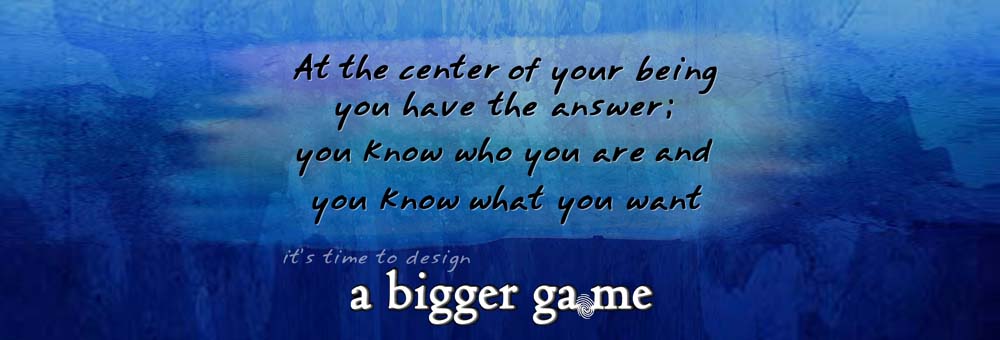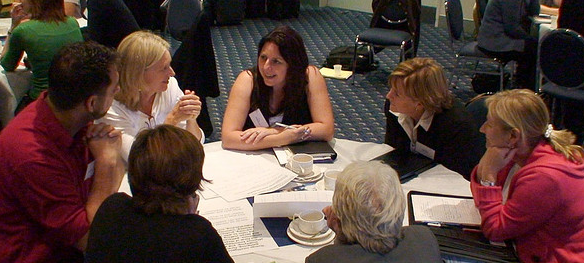We love to meet with like-minded peers! But they are not always close-at-hand, and so we seek out MeetUps, User Groups and Conferences. Still, the hallway conversations there, while stimulating, are fleeting. Really, nothing beats the synergy of intentionally collaborating with our peers. We experience this in-the-small at UnConferences: you name your passion, your puzzle, and “the right people” come to help explore something important, for an hour or a day. We meet strangers there who share our interests and values, and come away inspired and encouraged! And then, too often, we all go our separate ways and lose track of one another.
The social web is, of course, changing all this: we stay in touch via Twitter, LinkedIn and Facebook, albeit somewhat accidentally. What I still find missing in these interactions is follow-through. I tend to muse, chat and experiment on Twitter, but I also want partnership, mutual commitment and accountability to bring my ideas to fruition, and these are harder to find in the dispersed global community of peers in which I participate.
If you also crave more challenge, lively dialogue, and the support of a consistent group of peers – allow me to introduce you to: the Mastermind group!
What is a Mastermind group?
A Mastermind group is a regular meetup of like-minded peers who commit to challenge and support one another to reach their most important goals.
“Mastermind groups offer a combination of brainstorming, education, peer accountability and support in a group setting to sharpen your business and personal skills. A mastermind group helps you and your mastermind group members achieve success.” —
Karen Greenstreet
The group is small, up to 6 people, frequent (monthly or bi-weekly), facilitated, and confidential, so real cases and problems can be explored in safety. A group typically starts out with a fixed time-frame, which can later be extended, and may be themed by role (ex: Organisational Coaches) or topic (ex: “Growing a Learning Culture” or “Creating Workshops that Rock”) or may simply be a like-minded group of colleagues. Participants commit to be fully present at meetings and in pair-meetups in between, to share what they know, to challenge one another, and to hold one another accountable with respect and compassion.
Meeting facilitation is an important aspect of keeping groups lively and effective. Whether in person or on the phone, the group facilitator does not join conversations, but provides clear stuctures to help the group set intentions and stick to them – through working agreements, timeboxes – and uses facilitation tools and formats that keep the space open and allow everyone to contribute their wisdom and passion easily. Facilitation is usually a paid role, which should be discussed in your initial group design call with your facilitator.
Where does this format originate?
This Mastermind group idea, while now experiencing a resurgence, is of course nothing new! The term “Mastermind Alliance” was coined in the early 20th century by author and researcher Napolean Hill (more on that here). But in fact, people have been meeting for millenia in pubs and homes and parks to discuss the topics that make their hearts beat faster. Having a name for it simply helps us find one another more easily, and sets clear expectations for what we’ll do when we meet together.
I learned to lead Mastermind groups from Karen Greenstreet, whose passion for the topic is infectious! (check our her twitter feed for Mastermind tips and guides @kgreenstreet). A well-known element of her groups is the “hotseat” – at each meeting, one person presents a problem, opportunity or puzzle, and receives input from their partners. In itself, this is exciting, but then the impact of the hotseat is magnified by the addition of weekly check-ins, breakout-conversations, personal goal-setting and accountability conversations, and ongoing conversations with partners between meetups.
How does a Mastermind Group form?
Find your people:
What’s important for such a group is like-mindedness and commitment of participants. How this come to be varies. It is common to see groups initiated by a facilitator, as in Karen’s community listing. My own preference is to respond to “pull” from an individual or group who says “I’d love a group focused on (my passionate topic)” – then we work together to locate “the right people” and design a group that works for their specific situation and schedule. Another alternative is for a whole group to come and say “we are here, let’s start!” Groups have been known to form around common problems (managing self-organizing teams), dreams (successful entrepreneurship), books (read and discuss Tribal Leadership) and careeer paths (agile testers). Basically any area where you really want input to improve, where you feel stuck or somehow don’t make the time for it.
Design your alliance:
The group participants first meet to design their common focus, goals, and working agreements. At the end of this meeting, each must decide: am I in? Being “in” is a commitment to faithfully attend meetings over an agreed number of weeks, and making it a free choice ensures buy-in and strengthens the group. A schedule is set up and commited to, and the group designs a process for dealing with unexpected scheduling issues. Last, but not least: someone chooses to be in the first “hotseat” !
Meet, Rinse, Repeat!
The hotseat member does some preparation and shares their hotseat theme with the others in writing, a few days before they meet. The group checks in, sharing successes and challenges on the way to their personal goals, and the meeting moves into the hotseat portion, where everyone is free to offer advice, and the hotseat recipient will listen and take notes, but is not obliged to actively commit to anything in particular. There is also time for members to work together in pairs or all together, as they require, and short-term personal goals and next steps are designed and declared for the next interval. This pattern repeats regularly over the whole time defined for this group, be it 10 weeks or 10 months.
Partner work magnifies growth and engagement
Not all groups do this, but I strongly recommend that group members work in stable partner-pairs, simply meeting once in each interval to check in on progress and encourage one another. This gives the opportunity for more personal, focused conversation, and continuity across the whole of the group’s lifetime. It tends to keep the work alive between meetings, so participants arrive at meetings prepared, present and ready to start. It also guards against discouragement, as things don’t always go as hoped, and so one can share disappointments, and be reminded of successes, in a private conversation before joining the group meetup.
So, when do we start?
Simply set up a call with me, and let’s see what we can do together!
I can’t wait \o/
– Deb



